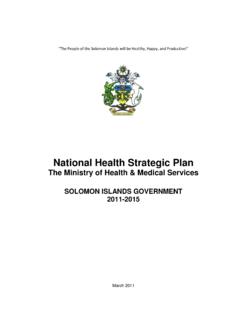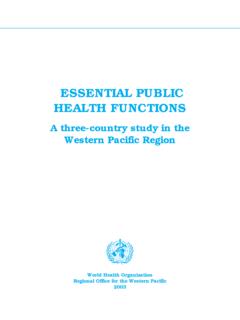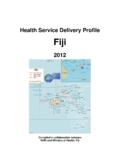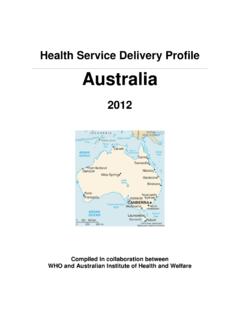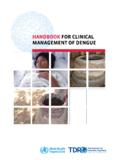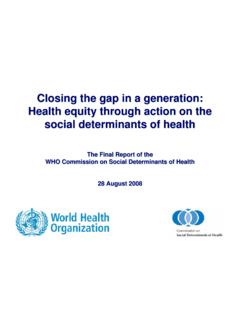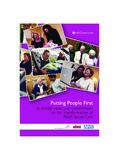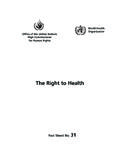Transcription of Violence against women in Solomon Islands - WPRO
1 social determinants of healthViolence against womenin Solomon Islands translating research into policy and action on the social determinants of healthsocial determinants of healthcountry caseViolence against womenin Solomon Islands translating research into policy and action on the social determinants of healthcOUNTRY cASE social dE TERmiNANTS Of hE AlThii World health Organization 2013 All rights reserved. Publications of the World health Organization are available on the WHO web site ( ) or can be purchased from WHO Press, World health Organization, 20 Avenue Appia, 1211 Geneva 27, Switzer-land (tel.: +41 22 791 3264; fax: +41 22 791 4857; e-mail: Requests for permission to reproduce or translate WHO publications whether for sale or for non-com-mercial distribution should be addressed to WHO Press through the WHO web site ( ).)
2 For WHO Western Pacific Regional Publications, request for per-mission to reproduce should be addressed to Publications Office, World health Organization, Regional Office for the Western Pacific, Box 2932, 1000, Manila, Philippines, fax: +632 521 1036, e-mail: designations employed and the presentation of the material in this publication do not imply the expression of any opinion whatsoever on the part of the World health Organization concerning the legal status of any country, territory, city or area or of its authorities, or concerning the delimitation of its fron-tiers or boundaries. Dotted lines on maps represent approximate border lines for which there may not yet be full mention of specific companies or of certain manufacturers products does not imply that they are en-dorsed or recommended by the World health Organization in preference to others of a similar nature that are not mentioned.
3 Errors and omissions excepted, the names of proprietary products are distinguished by initial capital reasonable precautions have been taken by the World health Organization to verify the information contained in this publication. However, the published material is being distributed without warranty of any kind, either expressed or implied. The responsibility for the interpretation and use of the material lies with the reader. In no event shall the World health Organization be liable for damages arising from its use. WHO Library Cataloguing-in-Publication DataViolence against women in Solomon Islands : translating research into policy and action on the social determinants of disparities.
4 Prevention and control. 4. women s health . health Organization Regional Office for the Western Pacific. ISBN-13 978 92 9061 646 7 (NLM Classification: WA 309) Violence against women in Solomon Islands Translating research into policy and action on the social determinants of healthiiiAcknowledgements ..ivABBReVIAtIons ..ivexecutIVe summARy ..vProblem ..4 Implementation ..6evaluation of results and impacts ..9 Follow up and lessons learnt ..11 ReFeRences ..13contentscOUNTRY cASE social dE TERmiNANTS Of hE AlThivAcknowledgementsthis document was prepared by Jennifer J. k. Rasanathan (consultant and principal writer). technical and editorial edits were provided by Anjana Bhushan (technical officer, health in development), debbie gray (technical officer, gender, equity, Human Rights and Ageing), and Britta Baer (technical officer, gender, equity and Human Rights) from the wHo Regional office for the western Pacific, with extensive technical input from the wHo Solomon Islands office.
5 The helpful input received from the Solomon Islands ministry of health , the secretariat of the Pacific community and wHo staff are gratefully acknowledged. ABBReVIAtIonsccc christian care centrecedAw convention on the elimination of All Forms of discrimination against womendFA t Australian government, department of Foreign Affairs and trade (dFA t)eVAw (national Policy on) elimination of Violence against womengBV gender-based Violence gewd (national Policy on) gender equality and women s developmentgewd nsc gewd national steering committeeFsc Family support centremwycA ministry of women , youth and children s AffairsnAP national Action Planngo nongovernmental organizationnso national statistics officentF national task ForcenZAId new Zealand Aid ProgrammenwP national women s PolicyRPAc Regional Project Advisory committeeRRRt Regional Rights Resource team sIFHss Solomon Islands Family health and safety studysIcA Fow Solomon Islands christian Association Federation of womensIncw Solomon Islands national council on womensIPPA Solomon Islands Planned Parenthood Association sIsc Solomon Islands support committeesPc secretariat of the Pacific communitytAP technical Advisory Panelun united nationsunIceF united nations children s
6 FundunFPA united nations Population FundunIF em united nations development Fund for women , now un womenunite united nations secretary-general s campaign to end Violence against womenVBmsI Voice Blong merewHo world health organizationViolence against women in Solomon Islands Translating research into policy and action on the social determinants of healthvexecutIV e summARyIn 2008, the wHo commission on social determinants of health underlined that gender inequality impacts health through discriminatory feeding patterns, Violence against women , lack of decision-making power, and unfair divisions of work, leisure, and possibilities of improving one s life, (1) in addition to limiting access to health -care services.
7 One of the most significant consequences of gender inequality in Solomon Islands is the high level of gender-based Violence women face, ranging from sexual Violence , coercion, emotional and/or physical Violence perpetrated by intimate and non-partners. Violence against women reflects and reinforces inequality between men and women ..[compromising] the health , dignity, security and autonomy of its survivors. (2) Violence against women has been largely normalized in the country: 73% of men and 73% of women believe Violence against women is justifiable, especially for infidelity and disobedience , when women do not live up to the gender roles that society imposes.
8 (2) A total of 64% of women aged 15 49 who had ever been in a relationship reported having experienced some form of Violence (emotional, physical and/or sexual) from an intimate partner, and 56% had experienced controlling behaviour. women who believed they could occasionally refuse sex were four times more likely to experience Violence from an intimate partner than those who did not. men cited acceptability of Violence and gender inequality as two main reasons for Violence against women . Almost all of them reported hitting their female partners as a form of discipline , suggesting that women could improve the situation by [learning] to obey [them].
9 Another manifestation and driver of gender inequality in Solomon Islands is the traditional practice of bride price. Although specific customs vary between communities, paying a bride price is considered similar to a property title, giving men ownership over women . gender norms of masculinity tend to encourage men to control their wives, often through Violence , while women felt that bride prices prevented them from leaving men. At the same time, and despite continued efforts by nongovernmental organizations (ngos) and faith-based organizations including Voice Blong mere (VBmsI), christian care centre (ccc), Family support centre (F sc) and Solomon Islands christian Association Federation of women (sIcA Fow), until recently political leaders trivialised and denied the existence of Violence against women .
10 [t]he region has been very slow in developing relevant legislation, policies, programmes and budgets to address the issue. In 2011, wHo convened the world conference on social determinants of health in Rio de Janeiro, Brazil, to review progress on implementing the recommendations of the wHo commission on social determinants of health , draw conclusions from lessons learnt and catalyse coordinated global action. the present paper was developed in the run-up to the world conference as examples of policy action aimed at tackling key determinants of health and reducing health inequities. covering the period between 2007 and 2011, it begins with a description of the first national study on Violence against women the Solomon Islands Family health and safety study: A study on Violence against women and children (sIFHss) as the result of growing regional and global attention to this issue, strong government leadership, growing advocacy from faith-based organizations and ngos, financial and technical support from the united nations (un) and donor agencies as well as the recognition that such Violence harms health and significantly impedes social and economic development.

